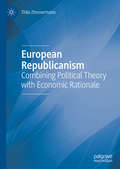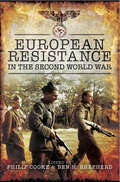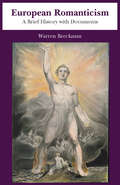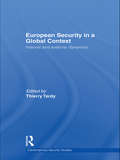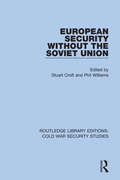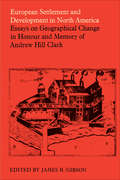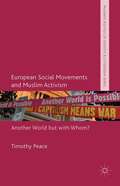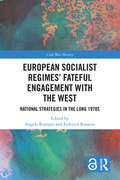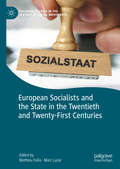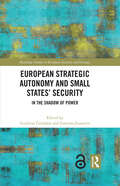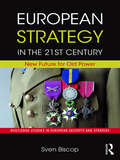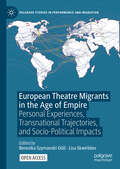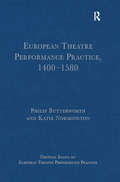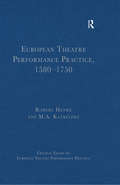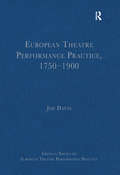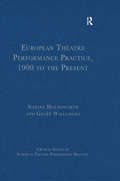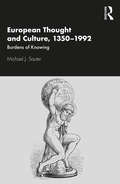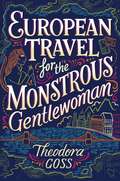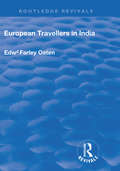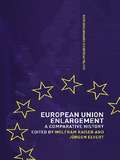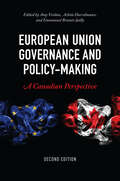- Table View
- List View
European Republicanism: Combining Political Theory with Economic Rationale
by Thilo ZimmermannThis book presents current theories of European integration, such as federalism, neo-functionalism and liberal intergovernmentalism with their strengths and weaknesses. It is then argued that the combination of republican theory with public good theory, the res publica of public goods, could better explain European integration. Public good theory has, however, to be adopted in order to make it applicable to European republicanism. Finally, the book demonstrates how this new framework can influence further academic debates, such as on sovereignty and monetary integration, externalities of a common European market and the driving force of European integration. It is maintained that as the republican approach does not follow a pure economic logic, there remains space for political considerations and motivations.In this topical and interdisciplinary book, the author combines many important strings of European integration theory, history, economics and political sciences, which are clearly brought together into a coherent analytical discourse. Its strength is the interdisciplinary interaction between politics and economics, as well as theoretical and practical issues which are of high relevance for public debate in Europe. This book will be of interest to scholars and students interested in economic integration, as well as history and political philosophy.
European Resistance in the Second World War
by Philip CookeResistance to German-led Axis occupation occurred all the way across the European continent during the Second World War. It took a wide range of forms – non-cooperation and disinformation, sabotage, espionage, armed opposition and full-scale partisan warfare. It is an important element in the experience and the national memory of the peoples who found themselves under Axis government and control. For over thirty years there has been no systematic attempt to give readers a panoramic yet detailed view of the make-up, actions and impact of resistance movements from Scandinavia down to Greece and from France through to Russia. This authoritative and accessible survey, written by a group of the leading experts in the field, provides a reliable, in-depth, up-to-date account of the resistance in each region and country along with an assessment of its effectiveness and of the Axis reaction to it. An extensive introduction by the editors Philip Cooke and Ben H. Shepherd draws the threads of the varied movements and groups together, highlighting the many differences and similarities between them.The book will be a significant contribution to the frequently heated debates about the importance of individual resistance movements. It will be thought-provoking reading for everyone who is interested in or studying occupied Europe during the Second World War.
European Romanticism: A Brief History with Documents
by Warren Breckman"The introductory essay is superb, the best short introduction to Romanticism I know. It is comprehensive, covering both the wide range of spheres that Romanticism affected--literature, philosophy, art, music, politics, nationalism--and the broad spectrum of European countries in which it was an influential cultural current. It offers a distinctive, unified interpretation of Romanticism that nonetheless does justice to the complexities of Romantic ideas." --Gerald Izenberg, Washington University in St. Louis
European Security in a Global Context: Internal and External Dynamics (Contemporary Security Studies)
by Thierry TardyThis new edited volume examines contemporary European security from three different standpoints. It explores security dynamics, first, within Europe; second, the interaction patterns between Europe and other parts of the world (the United States, Africa, the Middle East, China and India); and, finally, the external perceptions of European security. The first part of the book analyses the European security landscape. The roles of EU, NATO and the OSCE are given particular attention, as is the impact of their evolution- or enlargement- on the European security architecture and European security dynamics. In this context, Russia’s repositioning as a major power appears as a shaping factor of contemporary European geopolitics. The second part presents European security from an external perspective and considers interactions between Europe and other states or regions. Security trends and actors in Europe are examined from an American, Chinese, and Indian perspective, while Europe--Africa and Europe--Middle East relations are also addressed. This book will be of great interest to students of European Security, European politics and IR in general.
European Security in the Twenty-First Century: The Challenge of Multipolarity (Contemporary Security Studies)
by Adrian Hyde-PriceCombining a sophisticated theoretical analysis with detailed empirical case-studies, this book provides an original view of the challenges and threats to a stable peace order in Europe. The end of Cold War bipolarity has transformed Europe. Using structural realist theory, Adrian Hyde-Price analyzes the new security agenda confronting Europe in the twenty-first century. Europe, he argues, is not ‘primed for peace’ as mainstream thinking suggests, rather, it faces new security threats and the challenge of multipolarity. This critical and original volume looks at European security after the Iraq War, the failure of the EU constitution and the change of government in Germany. Reflecting on the inherently competitive and tragic nature of international politics, it concludes that realism provides the only firm foundations for an ethical foreign and security policy. European Security in the Twenty-First Century will appeal to students and scholars of international relations, European politics and security studies.
European Security without the Soviet Union (Routledge Library Editions: Cold War Security Studies #25)
by Stuart Croft; Phil WilliamsThis book, first published in 1992, examines the changing post-Cold War changing patterns of security in Europe by analysing the major themes, the primary security organisations and the policies of countries at the forefront of the security debate. Leading experts discuss the problems of nationalism, the difficulties of peacekeeping in Europe, and the future of NATO.
European Settlement and Development in North America
by James R. GibsonAndrew Hill Clark (1911-1975) was responsible for much of the recent rise of historical geography in North America. The focus on his research was the opening of New World lands by European peoples, and this North American experience is the subject of this collection of essays written by eight of Clark's students. They examine the role of a new physical and economic environment – particularly abundant and cheap land – in the settlement of New France, the cultural and physical problems that conditioned Russian America, the transformation of cultural regionalism in the eastern United States between the late colonial seaboard and the early republican interior, the changing economic geography of rice farming on the antebellum Southern seaboard, the interrelationships of the European and Indian economies in the pre-conquest fur trade of Canada, differential acculturation and ethnic territoriality among three immigrant groups in Kansas in the late nineteenth and early twentieth centuries, the development in England and the United States of similar social geographic images of the Victorian city, and the erosion of a sense of place and community by possessive individualism in eighteenth-century Pennsylvania. The essays are preceded by an appreciation of Clark as an historical geographer written by D.W. Meinig and are brought together in an epilogue by John Warkentin. The work is an unusually consistent Festchrift which should appeal to all interested in the patterns of North American settlement.
European Social Movements and Muslim Activism
by Timothy PeaceHow do progressive social movements deal with religious pluralism? In this book, Timothy Peace uses the example of the alter-globalisation movement to explain why social movement leaders in Britain and France reacted so differently to the emergence of Muslim activism.
European Socialism, Volume I: From the Industrial Revolution to the First World War and Its Aftermath
by Carl LandauerThis title is part of UC Press's Voices Revived program, which commemorates University of California Press’s mission to seek out and cultivate the brightest minds and give them voice, reach, and impact. Drawing on a backlist dating to 1893, Voices Revived makes high-quality, peer-reviewed scholarship accessible once again using print-on-demand technology. This title was originally published in 1959.
European Socialist Regimes' Fateful Engagement with the West: National Strategies in the Long 1970s (Cold War History)
by Angela Romano; Federico RomeroThis edited volume analyses European socialist countries’ strategy of engagement with the West and the European Economic Community in the long 1970s. The book focuses on a time when the socialist regimes of Central and Eastern Europe banked their hopes for prosperity and stability on enhanced relations with the West. Crossing the traditional differences among diverse fields of historiography, it assesses the complex influence of European and global processes of transformation on the socialist elites’ reading of the international political and economic environment and their consequent decision-making. The volume also explores the debate in each country among and within the elites involved in policymaking as they elaborated this strategic view and coped with shortcomings and unexpected turns. A comparative analysis of national cases shows a shared logic and common patterns, together with national variations and a plurality of views on the desirability of exchanges with their capitalist neighbours and on the ways to promote them. The multinational coverage of seven countries makes this volume a starting point for anyone interested in each socialist state’s foreign policy, intra-bloc relations, economic strategy, transformation and collapse, relations with the European Community and access to the EU. This book will be of much interest to students and researchers of Cold War Studies, European history, and International Relations.
European Socialists and the State in the Twentieth and Twenty-First Centuries (Palgrave Studies in the History of Social Movements)
by Mathieu Fulla Marc LazarThis edited volume promotes a comparative and transnational approach to the complex and ambiguous relationship between West European socialism and the contemporary state over the longue durée. It encourages a better understanding of socialism while also casting an original light on the history of the contemporary state in Europe. Socialists have been a prime political force since the late nineteenth century through to the present. Through their strength, their presence at the heart of societies, their dynamism, inventiveness, and influence, they have left their mark on the European physiognomy and helped to forge part of its identity. This is particularly true where the welfare state is concerned, and the role played by the state in constructing, embedding, and extending this social model. Surprisingly, there has been no research aiming to systematically analyse the relationship between socialism and the state. This volume fills a gap in knowledge by rejecting the media simplification and political polemic maintained by opponents of socialism – and sometimes by socialists themselves – which systematically links socialism with “statism”. It focuses on numerous case studies involving France, Italy, Spain, Greece, Austria, Germany, Belgium, the United Kingdom and Scandinavia, and highlights the diversity of organisations within European socialism. Ultimately, this book demonstrates that the fate of this political culture depends on the socialist parties themselves but also on any new configurations that states may assume. Conversely, the future of states will also depend partly on the choices made by socialists, if they still exist and still have the means to shape decisions and make their voices heard.
European Strategic Autonomy and Small States' Security: In the Shadow of Power (Routledge Studies in European Security and Strategy)
by Justinas Juozaitis Giedrius ČesnakasThis book analyses whether the EU’s drift towards European strategic autonomy presents a challenge or a window of opportunity for its small member states to advance their security interests. The volume presents small states’ perceptions of European strategic autonomy, highlighting their expectations and concerns. The chapters focus on the depth and breadth of European strategic autonomy, national security considerations, assessment of the impact on transatlantic relations, the expected outputs, and its potential impact on the EU’s institutional structure. It also shows how systemic circumstances and the interests of powerful states, either belonging to the EU (France, Germany, and Poland) or having a significant say in European security architecture (the US), establish opportunities and constraints for the small states to shape European strategic autonomy. In particular, the study focuses on the diverging interests of the Baltic states (Estonia, Latvia, and Lithuania), Belgium, Denmark, Greece, Hungary, and the Netherlands. It demonstrates that, in most cases, European strategic autonomy is perceived not as an alternative to NATO but as a supplementary element that could facilitate the development of national military capabilities, indigenous defence industries and resilience to non-military threats. Ultimately, the book suggests that national approaches towards European strategic autonomy mainly stem from pragmatic national security and foreign policy considerations, while largely ignoring grand strategic ideas. This book will be of much interest to students of European politics, security studies, and international relations.
European Strategy in the 21st Century: New Future for Old Power (Routledge Studies in European Security and Strategy)
by Sven BiscopThis book argues that Europe, through the European Union (EU), should act as a great power in the 21st century. The course of world politics is determined by the interaction between great powers. Those powers are the US, the established power; Russia, the declining power; China, the rising power; and the EU, the power that doesn’t know whether it wants to be a power. If the EU does not just want to undergo the policies of the other powers it will have to become one itself, but it should differ in its strategy. In this book, Sven Biscop seeks to demonstrate that the EU has the means to pursue a distinctive great power strategy, a middle way between dreamy idealism and unprincipled pragmatism, and can play a crucial stabilizing role in this increasingly unstable world. Written by a leading scholar, this book will be of much interest to students of European security, EU policy, strategic studies and international relations.
European Theatre Migrants in the Age of Empire: Personal Experiences, Transnational Trajectories, and Socio-Political Impacts (Palgrave Studies in Performance and Migration)
by Berenika Szymanski-Düll Lisa SkwirbliesThis open access edited volume constitutes the first historical study of the phenomenon of European theatre migration, and thus contributes in new and important ways to the formation of a historical discourse on theatre and migration. The hidden histories of European theatre migration that this book seeks to explore allow us to rethink global theatre history as a history of mobility with Europe as the point of departure rather than the point of arrival. It also allows the reader to challenge and to decenter a European self-understanding of insularity and a European cosmopolitanism ignorant of its imperial and colonial roots.
European Theatre Performance Practice, 1400-1580 (Critical Essays on European Theatre Performance Practice)
by Philip ButterworthThis volume brings together important records of medieval theatre practice between 1400 and 1580. The records are drawn from a wide range of spheres including civic, ecclesiastical, trade and guild records and consist of payments for materials, techniques and services; also included are some eye witness accounts. Alongside these records is a selection of the best contemporary research conducted into medieval performance practice, which features ground-breaking analysis and challenges current understanding, knowledge and authority in this field. These contributions of rigorous scholarship complement and support the work of the well-known Records of Early English Drama project and help to further illuminate contemporary fifteenth and early sixteenth-century theatre performance practice.
European Theatre Performance Practice, 1580-1750 (Critical Essays on European Theatre Performance Practice)
by Robert HenkeThis volume presents foundational and representative essays of the last half century on theatre performance practice during the period 1580 to 1750. The particular focus is on the nature of playing spaces, staging, acting and audience response in professional theatre and the selection of previously published research articles and book chapters includes significant works on topics such as Shakespearean staging, French and Spanish theatre audiences, the challenging aspects of the evolution of Italian renaissance acting practice, and the ’hidden’ dimensions of performance. The essays provide coherent transnational coverage as well as detailed treatments of their individual topics. Considerations of theatre practice in Italy, Spain and France, as well as England, place Shakespeare’s theatre in its European context to reveal surprising commonalities and salient differences in the performance practice of early modern Europe’s major professional theatres. This volume is an indispensable reference work for university libraries, lecturers, researchers and practitioners and offers a coherent overview of early modern comparative performance practice, and a deeper understanding of the field’s major topics and developments.
European Theatre Performance Practice, 1750–1900 (Critical Essays on European Theatre Performance Practice)
by Jim DavisThis volume contains key articles and chapters which represent both seminal and innovative scholarship on European theatre performance practice from 1750 to 1900. The selected topics focus on acting and performance, staging (including set design and lighting), and audiences, and are approached with a broad perspective as well as with in-depth, focussed analysis. The volume captures the rich, dynamic and variegated nature of European theatre throughout the late-eighteenth and nineteenth centuries and provides a carefully selected body of significant texts on this important period of theatre history.
European Theatre Performance Practice, 1900 to the Present (Critical Essays on European Theatre Performance Practice)
by Geoff WillcocksThis volume captures the rich diversity of European performance practice evident in the twentieth and early part of the twenty-first century. Written by leading directors, actors, dancers, scenographers and academics from across Europe, the collection spans a broad range of subject areas including dance, theatre, live art, multimedia performance and street protest. The essays are divided into three sections on: performers and performing; staging performance; representation and reception, and document innovations in acting, performance and stagecraft by key practitioners. Articles also explore the ways that performance has been used to stage debates around major preoccupations of the age such as war, the human condition, globalization, the impact of new technologies and identity politics. This volume, which features previously published performance manifestoes, articles, and book chapters on the most frequently discussed and debated topics in the field, is an indispensable reference work for both academics and students.
European Thought and Culture, 1350-1992: Burdens of Knowing
by Michael J. SauterThis book explores the main currents of European thought between 1350 and 1992, which it approaches in two principal ways: culture as produced by place and the progressive unmooring of thought from previously set religious and philosophical boundaries. The book reads the period against spatial thought’s history (spatial sciences such as geography or Euclidean geometry) to argue that Europe cannot be understood as a continent in intellectual terms or its history organized with respect to traditional spatial-geographic categories. Instead we need to understand European intellectual history in terms of a culture that defined its own place, as opposed to a place that produced a given culture. It then builds on this idea to argue that Europe’s overweening drive to know more about humanity and the cosmos continually breached the boundaries set by venerable religious and philosophical traditions. In this respect, spatial thought foregrounded the human at the unchanging’s expense, with European thought slowly becoming unmoored, as it doggedly produced knowledge at wisdom’s expense. Michael J. Sauter illustrates this by pursuing historical themes across different chapters, including European thought’s exit from the medieval period, the Renaissance, the Reformation, the Scientific Revolution, the Enlightenment and Romanticism, the Industrial Revolution, and war and culture, offering a thorough overview of European thought during this period. The book concludes by explaining how contemporary culture has forgotten what early modern thinkers such as Michel de Montaigne still knew, namely, that too little skepticism toward one’s own certainties makes one a danger to others. Offering a comprehensive introduction to European thought that stretches from the late fourteenth to the late twentieth century, this is the perfect one-volume study for students of European intellectual history.
European Total Defence: Past, Present and Future (Routledge Advances in Defence Studies)
by Paal Sigurd Hilde Floribert Baudet Toms Rostoks Joakim Berndtsson Jörg Noll Giedrius Česnakas Kevin D. Stringer Gjermund Forfang Rongved Theo Brinkel Sergii Glebov Denys Kuzmin Anne Roelsgaard Obling Rasmus Rannikko Colonel Mikael Salo Teija Sederholm Piotr Szymański Annelies Van Vark Viljar VeebelThis book analyses the origins, experiences, and challenges of total defence in Europe and comprises a broad spectrum of national case studies as well as one international organisation – NATO.The topic of total defence has been brought to the fore by deglobalisation, augmented international tension, the US pivot to Asia, grey‑zone threats, Covid‑19, and not least by the increased Russian threat during the 2010s, which culminated in the invasion of Ukraine in 2022. The analysis here is based on an in‑depth analysis of the four major Nordic countries, the Baltic countries, Poland, Ukraine, Switzerland, and the Netherlands, as well as a perspective from NATO itself. This volume argues that although the activity that we describe as total defence has many labels and various expressions, which follow from each country’s own history, geopolitical setting, and strategic culture, some aspects of it are to be found in most countries. This is because all countries, at least to some extent, will need their armed forces to rely on civil society in a crisis; however, it is a long way from this to a full‑fledged total defence concept. With continued international tension, the need to build resilient societies, and the European need to take more responsibility for its own security in a cost‑efficient way, this book argues that we should expect total defence to gain importance in the 21st century.This book will be of much interest to students of security studies, defence studies, European politics, and International Relations in general.
European Travel for the Monstrous Gentlewoman (The Extraordinary Adventures of the Athena Club #2)
by Theodora GossIn the sequel to the Nebula finalist The Strange Case of the Alchemist&’s Daughter, Mary Jekyll and the rest of the daughters of mad scientists from literature embark on a madcap adventure across Europe to rescue another monstrous girl and stop the Alchemical Society&’s nefarious plans once and for all.Mary Jekyll&’s life has been peaceful since she helped Sherlock Holmes and Dr. Watson solve the Whitechapel Murders. Beatrice Rappaccini, Catherine Moreau, Justine Frankenstein, and Mary&’s sister Diana Hyde have settled into the Jekyll household in London, and although they sometimes quarrel, the members of the Athena Club get along as well as any five young women with very different personalities. At least they can always rely on Mrs. Poole. But when Mary receives a telegram that Lucinda Van Helsing has been kidnapped, the Athena Club must travel to the Austro-Hungarian Empire to rescue yet another young woman who has been subjected to horrific experimentation. Where is Lucinda, and what has Professor Van Helsing been doing to his daughter? Can Mary, Diana, Beatrice, and Justine reach her in time? Racing against the clock to save Lucinda from certain doom, the Athena Club embarks on a madcap journey across Europe. From Paris to Vienna to Budapest, Mary and her friends must make new allies, face old enemies, and finally confront the fearsome, secretive Alchemical Society. It&’s time for these monstrous gentlewomen to overcome the past and create their own destinies.
European Travellers in India: During the Fifteenth, Sixteenth and Seventeenth Centuries; The Evidence Afforded by them with Respect to Indian Social Institutions and the Nature and Influence of Indian Governments (Routledge Revivals)
by Edward Farley OatenOriginally published in 1909, this book contains a careful dissection and analysis of european travellers in India's narratives; the author has striven throughout to regard the various characters who flit across the following pages in the light as much of adventures and pioneers as of collectors of social and political facts - in other words, the author has tried to preserve in their narrative as much as they could of the large amount of humna interest which naturally invests the subject, and animates the writings, of these early wanderers in India.
European Union Direct Investment in China: Characteristics, Challenges and Perspectives (Routledge Studies In Global Competition Ser. #Vol. 15)
by Daniel Van Den Bulcke Haiyan Zhang Maria do Céu EstevesChina's immersion in the world economy and trading system is a continued source of great interest throughout the globe.The book is divided into three parts, the first being an overview of the Chinese investment environment and the development of foreign direct investment (FDI) over the last twenty years. The second part then goes on to focus specif
European Union Enlargement: A Comparative History (Routledge Advances in European Politics #Vol. 18)
by Wolfram Kaiser Jürgen ElvertEuropean Union Enlargement provides a comparative analysis of the post-war European policies of those states that joined the European Union between 1973 and 1995.The volume draws upon new empirical research in order to investigate the policies that these 'newcomer' states have had towards Europe since 1945, with an emphasis on their experience of membership and its possible Europeanising effect. A final comparative chapter draws the national European policies of the 'newcomers' together and outlines what they have brought to the EU. The book also tests integration theories against the available evidence, demonstrating their limited explanatory value and the economic, political and cultural specificity of different national paths towards EU integration.
European Union Governance and Policy-Making, Second Edition: A Canadian Perspective
by Amy Verdun Emmanuel Brunet-Jailly Achim HurrelmannEuropean Union Governance and Policy-Making introduces the politics of the European Union (EU) to a student audience. The book is explicitly written for students enrolled in universities in Canada, or other non-EU countries, and builds on their academic background. Chapters cover the political and legal system of the EU, theories of European integration, core EU policies such as the Single Market, its single currency, migration policy, EU enlargement, as well as pressing issues facing the further development of European integration. This second edition has been comprehensively revised and updated to include a discussion of Brexit, the European Green Deal, COVID-19, and the Russian invasion of Ukraine. Written by leading Canadian scholars in the field of European integration, as well as international experts with teaching experience in Canadian universities, this textbook leverages the comparison to Canada and its federal system to help students understand what is unique about the European Union.
